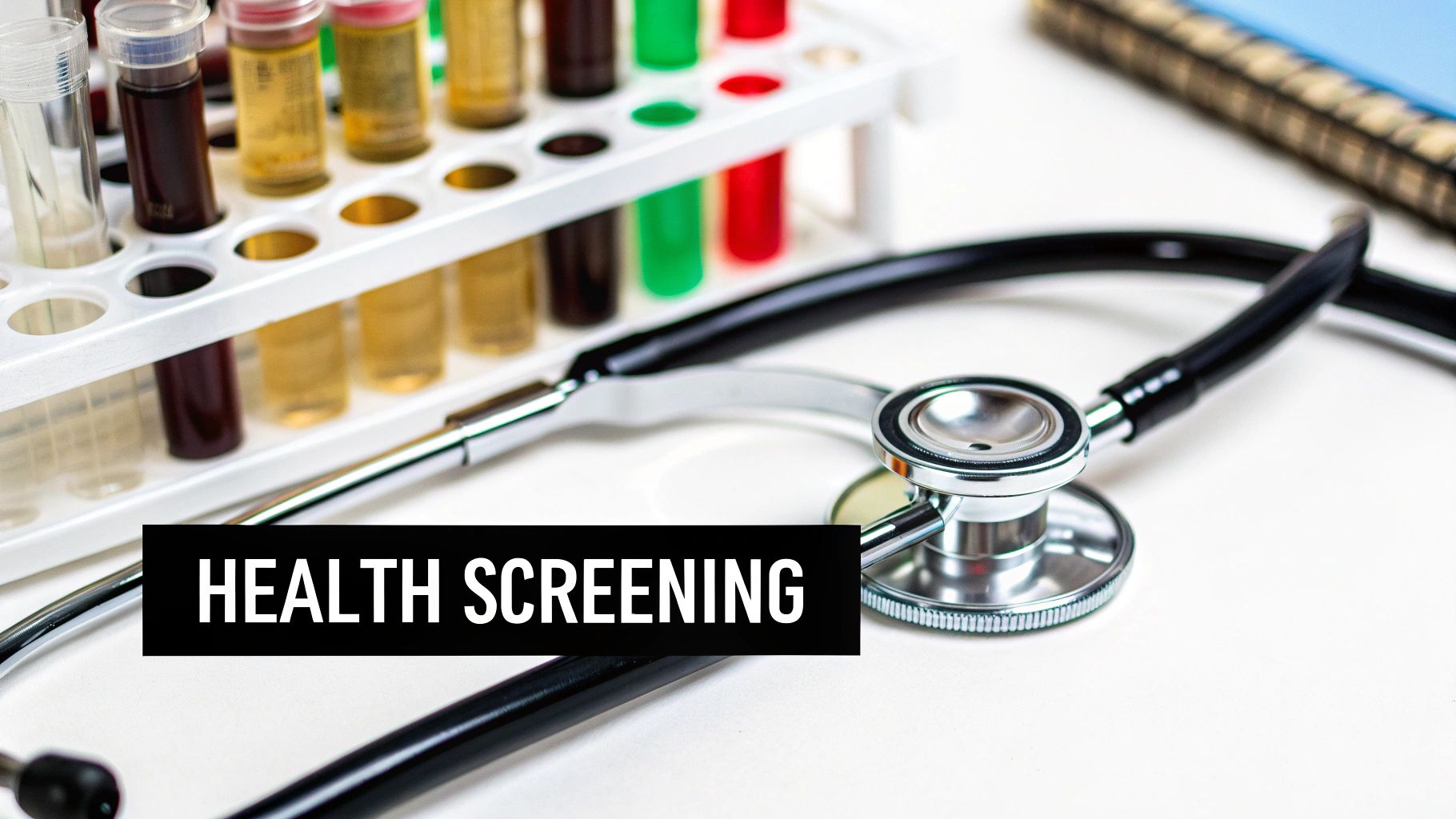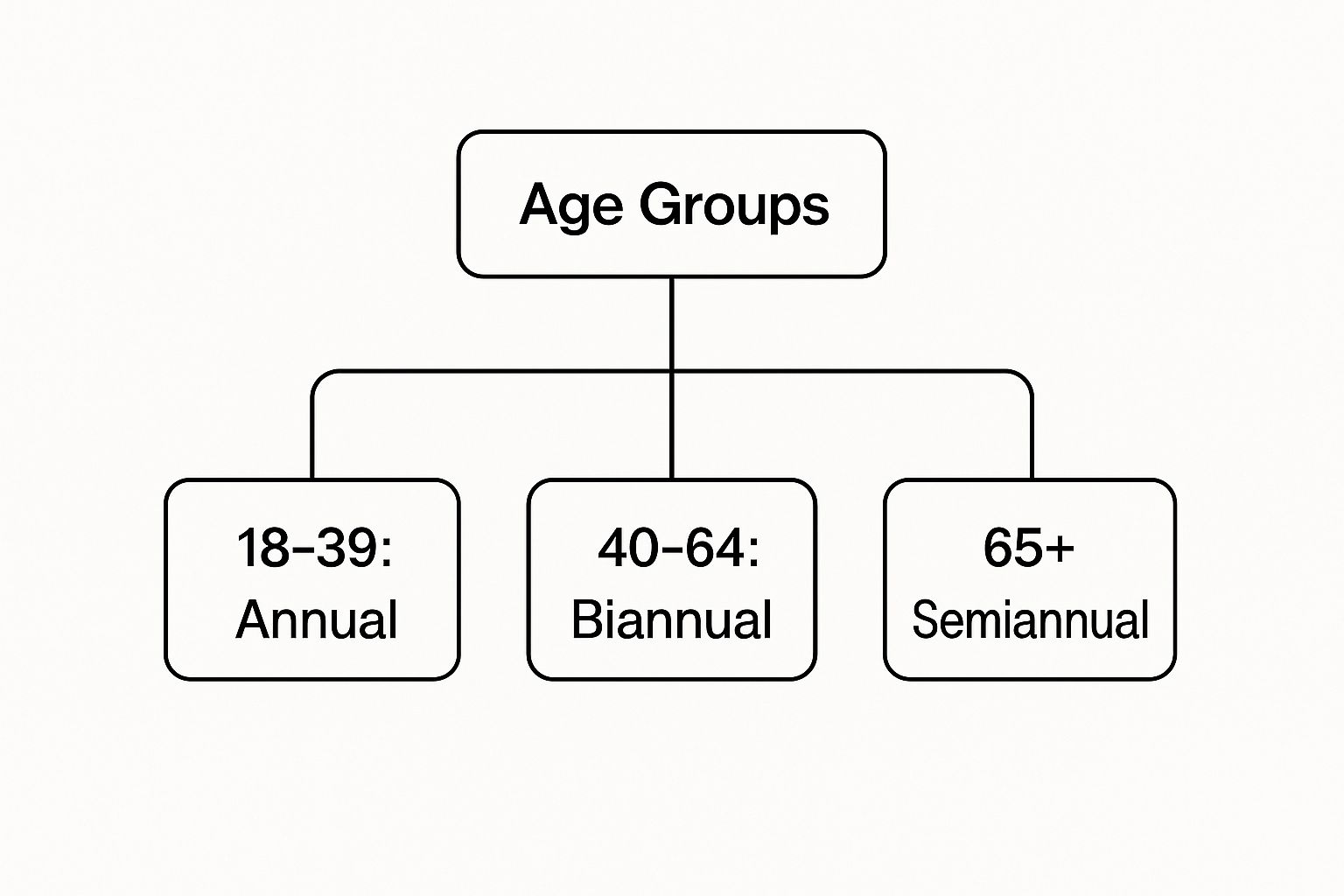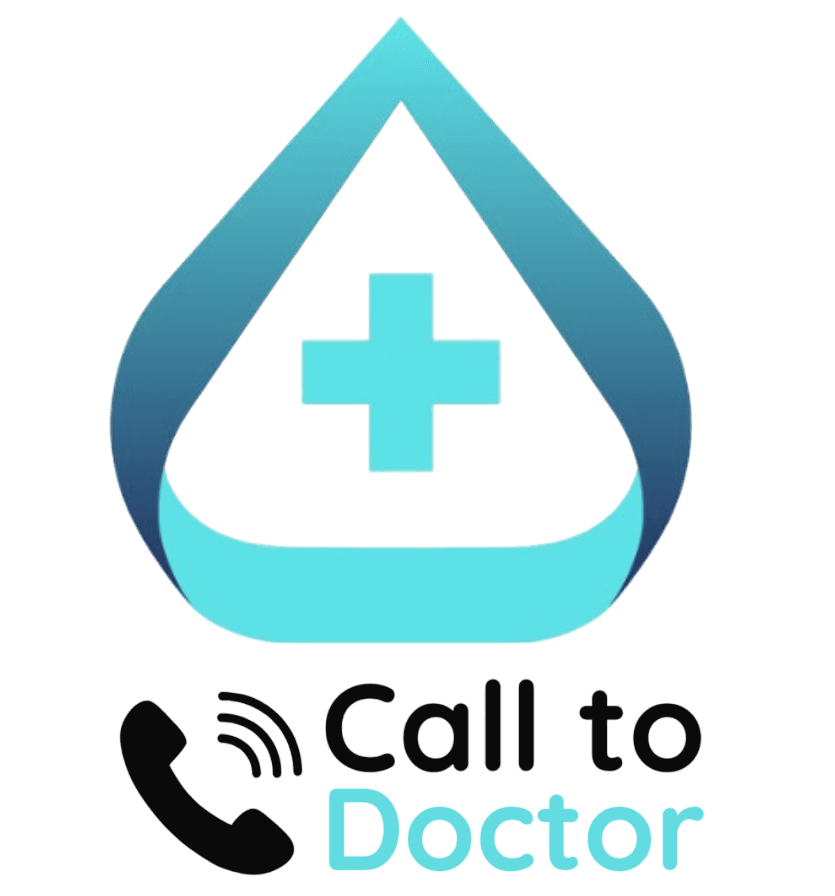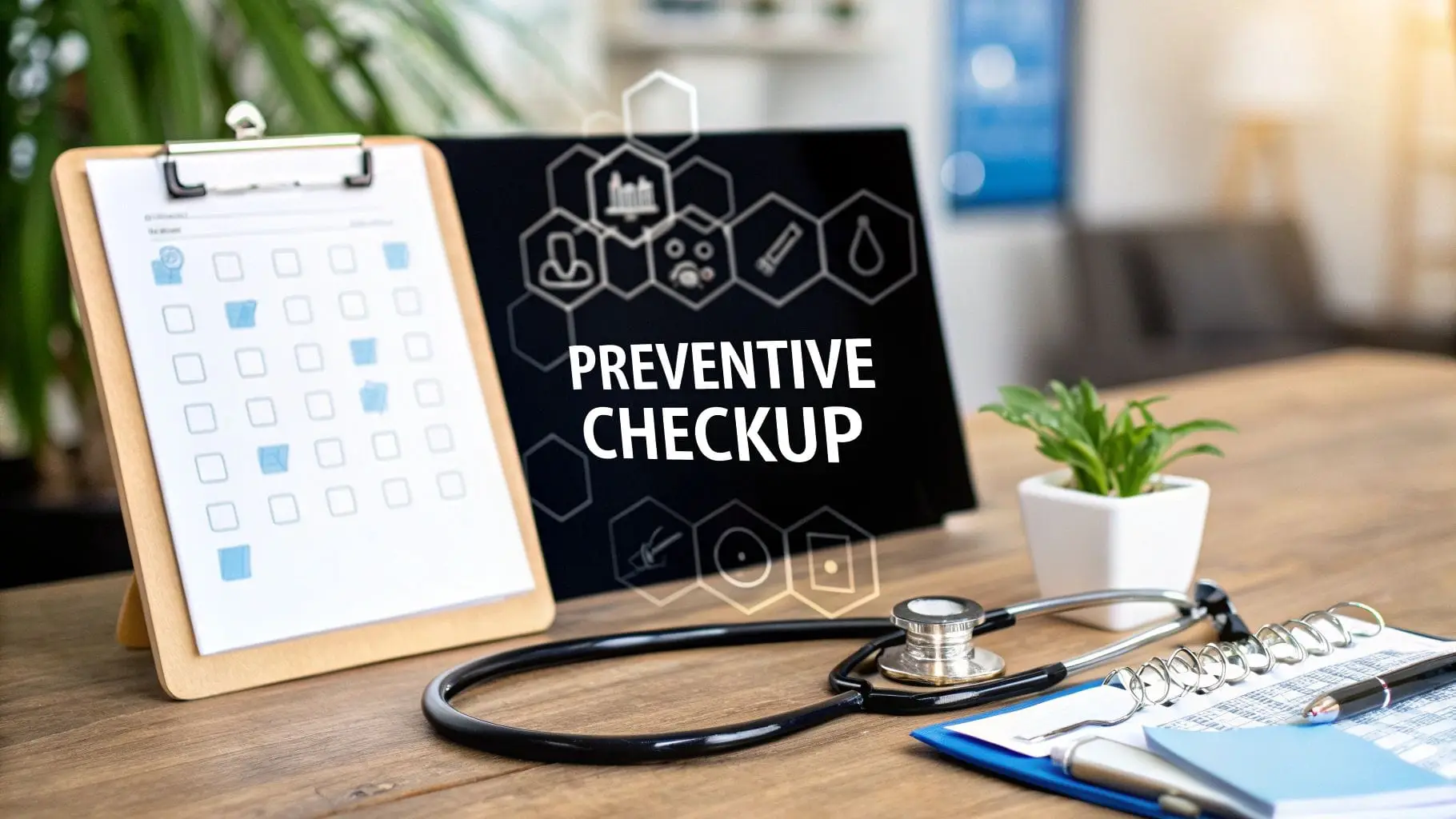Most of us only think about seeing a doctor when something feels wrong. A sudden pain, a lingering cough, or a fever that won't break—that’s our typical cue. But what if you could take control before symptoms start? A preventive health checkup is your secret weapon: a proactive medical assessment you get when you feel perfectly fine.
The core goal is to catch potential health issues long before they become serious problems. It represents a crucial shift in mindset—from merely treating illness to actively building and maintaining long-term wellness.
What Is a Preventive Health Checkup, Exactly?
Think of your body like a high-performance car. You wouldn't just drive it until the engine seizes, right? Of course not. You'd take it for regular servicing to keep it running smoothly and efficiently. A preventive health checkup is your body's essential tune-up, designed to spot small issues before they escalate into major breakdowns.
This proactive approach is about more than just seeing a doctor when you’re under the weather. It’s about taking the driver's seat of your own health journey. Regular screenings are the tools that empower you and your doctor to build a solid, long-term health plan together, tailored specifically to you.
Establishing Your Health Baseline
One of the most valuable benefits of a regular preventive health checkup is establishing your personal health baseline. This is a snapshot of your body's "normal," capturing key metrics like your blood pressure, cholesterol, and blood sugar levels when you're feeling well.
Once this baseline is established, it becomes much easier for your doctor to notice subtle shifts over time. A slight uptick in blood pressure might seem insignificant in a single appointment, but when compared to your readings from previous years, it could be a critical early warning sign. That historical data is priceless for long-term health management.
The Shift from Reactive to Proactive Healthcare
For generations, healthcare has been largely reactive: you feel sick, you go to the doctor, and you get treated. Preventive care flips that model on its head, empowering you to get ahead of health problems before they even start.
This strategic shift helps you:
- Identify risks early: Finding conditions like pre-diabetes or high blood pressure when they're far easier to manage or even reverse.
- Make informed lifestyle decisions: When you know your numbers and personal risk factors, you can make smarter choices about diet, exercise, and daily habits.
- Create a long-term wellness strategy: You're building a roadmap for a healthier future, not just patching up problems as they appear.
A preventive health checkup transforms healthcare from a response to symptoms into a forward-thinking strategy for a longer, healthier life. It's about knowing your numbers, understanding your risks, and taking control.
This commitment puts you firmly in control. Instead of waiting for a warning light to flash, you're actively monitoring your health and making small adjustments to stay on course. If you're ready to take charge, exploring the world of preventive healthcare is the perfect first step. It's less about fearing illness and more about celebrating and maintaining your good health for years to come.
The True Value of Proactive Health Screenings

So, you understand what a preventive health checkup is. That’s the first step. The next, and arguably more important step, is to truly grasp how life-changing it can be. This isn't just about checking a box on your annual to-do list; it’s one of the most powerful investments you can make in your future.
The real value of this proactive approach boils down to three core advantages that directly impact your health, finances, and peace of mind. Let’s break down why switching from a "wait-and-see" mindset is a game-changer.
Early Detection: The Ultimate Health Advantage
At its heart, the primary goal of a preventive health checkup is to spot trouble early. Many of the most serious chronic diseases—think heart disease, type 2 diabetes, and certain cancers—are notoriously silent in their early stages. They can develop for years without a single noticeable symptom. By the time you feel that something is wrong, the condition may already be advanced and much harder to treat.
A simple, routine blood test, for example, can flag high cholesterol or rising blood sugar levels long before they cause a heart attack or diabetic complications. This early warning is a golden opportunity. It gives you and your doctor a critical window to make simple yet effective changes—like adjusting your diet or starting a medication—to get things under control before real damage occurs.
"Proactive health screening provides a perfect opportunity to look at your health before a diagnosis. It allows you to address risks when they are most manageable, turning potential major health crises into minor adjustments."
Catching health issues early doesn't just lead to better outcomes; it often helps you avoid invasive medical procedures altogether. It’s the difference between managing high blood pressure with lifestyle tweaks versus needing emergency surgery for a clogged artery.
The Financial Sense of Prevention
It might sound counterintuitive, but spending a little on a preventive health checkup now can save you a fortune down the road. The financial reality is that the cost of managing an advanced chronic disease is astronomically higher than the cost of preventing it. Treating late-stage cancer or advanced heart disease can lead to eye-watering bills for surgeries, long hospital stays, and expensive, ongoing medications.
Think of it this way: the price of an annual screening is a small, predictable expense. In contrast, the cost of a sudden medical emergency can be devastating, creating immense financial and emotional stress for you and your family. By catching issues early, you sidestep those much larger future expenses.
This proactive mindset is gaining significant traction. The preventive health checkup market in the Middle East and Africa was valued at USD 21.8 billion in 2025 and is projected to soar to USD 42.3 billion by 2031, reflecting a powerful annual growth rate of 11.5%. You can discover more insights about this growing market and see how it’s reshaping regional healthcare.
Achieving True Peace of Mind
Beyond the physical and financial benefits, you can't put a price on the emotional value of a preventive checkup. Living with uncertainty about your health creates a low-level hum of stress and anxiety that can wear you down. A comprehensive screening replaces that noise with clarity and knowledge.
Imagine two people. One avoids the doctor, quietly worrying about their family history of heart disease. The other gets regular screenings, knows their cholesterol and blood pressure numbers, and has a clear plan with their doctor. The second person doesn't just have better health data—they have genuine peace of mind, which is a massive component of true well-being.
Knowing where you stand health-wise empowers you to live more freely and confidently. It replaces the fear of the unknown with actionable information, allowing you to focus on enjoying your life instead of worrying about what might be happening inside your body. That confidence is perhaps the most priceless benefit of all.
Essential Checkups for Every Stage of Your Life
Your health needs are not static; they evolve as you move through life, and your approach to healthcare should adapt accordingly. Think of it like maintaining a car: the service it needs at 20,000 kilometers is very different from what's required at 200,000. Your body is no different.
Understanding which screenings are most important for your age group is the key to a smart preventive health checkup strategy. It can seem like a lot to track, but we've broken it down into a simple roadmap covering the essentials from your 20s through your 60s and beyond.

As the chart illustrates, the recommended frequency for checkups generally increases with age, reflecting the natural shifts in health risks over time.
To make this even clearer, here’s a quick overview of recommended health screenings tailored for different stages of adulthood. This table is an excellent starting point for a conversation with your doctor about your proactive health plan.
Recommended Preventive Health Checkups by Age Group
| Age Group | Key Screenings & Tests | Recommended Frequency |
|---|---|---|
| 20s & 30s | Blood Pressure, Cholesterol Profile, BMI Assessment, Cervical Cancer Screening (for women) | Every 1-3 years, based on risk factors |
| 40s & 50s | Mammograms, Colorectal Cancer Screening, Type 2 Diabetes Screening, Prostate Cancer Discussion (for men) | Annually or as advised by your doctor |
| 60s & Beyond | Bone Density Scan, Vision & Hearing Tests, Cognitive Assessment, Regular Vaccinations | Annually and as needed for specific concerns |
This table serves as a general guide. Your personal health history, family background, and lifestyle will all play a crucial role in creating the perfect screening schedule for you.
The Foundation Years: Your 20s and 30s
These are the years for laying the groundwork for a long, healthy life. A preventive health checkup in your 20s and 30s is about establishing a health baseline and catching subtle red flags before they can become bigger issues. It's the perfect time to build healthy habits that will pay dividends for decades.
While it's easy to feel invincible at this age, this is precisely when certain risk factors can quietly begin to develop. Regular checkups help monitor key health markers.
Key screenings at this stage typically include:
- Blood Pressure Screening: High blood pressure is often called the "silent killer" because it usually has no symptoms but is a major risk factor for heart disease and stroke.
- Cholesterol and Lipid Profile: A simple blood test provides a snapshot of your cardiovascular health by measuring your cholesterol levels.
- Body Mass Index (BMI) Assessment: This is a quick way to check if you’re in a healthy weight range, a factor tied to dozens of health outcomes.
- Cervical Cancer Screening: For women, routine Pap tests are crucial for detecting early signs of cervical cancer, making it one of the most preventable cancers.
The Vigilant Years: Your 40s and 50s
As you reach your 40s and 50s, your body undergoes significant changes, and the risk for certain chronic conditions naturally increases. This is when a more targeted preventive health checkup strategy becomes essential. Screenings become more specific to look for age-related issues.
Early detection is paramount during these decades. Many conditions, if caught now, can be managed effectively with lifestyle adjustments or medication, preventing serious complications later. This is the time to be vigilant.
Building on the foundational checks, this stage adds more targeted screenings:
- Mammograms: For women, regular mammograms are the most effective tool for early breast cancer detection, typically recommended to start at age 40.
- Colorectal Cancer Screening: It’s recommended that both men and women begin screening for colorectal cancer, often starting with a colonoscopy around age 45.
- Type 2 Diabetes Screening: Your doctor will likely recommend regular blood sugar tests to screen for pre-diabetes and diabetes, particularly if you have other risk factors.
- Prostate Cancer Screening: Men should start a conversation with their doctor about Prostate-Specific Antigen (PSA) tests to weigh the pros and cons based on their personal risk profile.
To understand how these individual tests fit into a broader picture, it’s helpful to explore the components of a full body check up, which often bundles many of these essential, age-specific screenings into one comprehensive package.
The Golden Years: Your 60s and Beyond
Once you reach your 60s, health priorities shift again. The goal of a preventive health checkup now is to manage any existing conditions, preserve your quality of life, and screen for issues that become more common with age. It’s all about protecting your health and independence for as long as possible.
Consistent monitoring helps you stay active and healthy. The aim is to address any issues promptly to maintain function and prevent decline.
Key screenings in your golden years include:
- Bone Density Scan: This test checks for osteoporosis—a condition that weakens bones—and is especially important for postmenopausal women.
- Vision and Hearing Tests: Regular checks can catch conditions like glaucoma, cataracts, and age-related hearing loss early when they are most treatable.
- Cognitive Assessment: Simply talking to your doctor about any changes in memory or thinking is an important first step in monitoring your cognitive health.
- Vaccinations: Staying current on immunizations for flu, pneumonia, and shingles is one of the easiest and most effective ways to protect your health.
By knowing which screenings are recommended for your age, you can take an active role in your health journey and make empowered decisions for a long, vibrant life.
How to Prepare for Your Health Checkup

To get the most value out of your preventive health checkup, a small amount of preparation can make all the difference. When you walk in ready and informed, you transform a routine visit into a powerful, collaborative session focused on your long-term wellness.
Think of it this way: being prepared ensures every minute with your doctor is spent effectively. You become an active participant in your care, not just a passive recipient. This simple shift helps you leave feeling clear, confident, and in control of your health plan.
Before Your Appointment: Key Steps
Your preparation should start a few days before you see the doctor. These simple tasks help the appointment run smoothly and ensure your test results are as accurate as possible.
First, check with the clinic for any specific instructions. The most common is fasting, which is often required for blood tests that check your sugar and cholesterol levels. This usually means no food or drinks (except water) for 8-12 hours beforehand.
Next, gather all your relevant health information in one place. This gives your doctor a complete and accurate picture of your health status.
Here’s a quick pre-visit checklist:
- List of Medications: Write down everything you take regularly, including prescriptions, over-the-counter drugs, vitamins, and herbal supplements. Remember to include the dosages.
- Medical and Family History: Note any major illnesses, surgeries, or chronic conditions you've had. It's also extremely helpful to mention serious health issues that run in your immediate family, like heart disease, cancer, or diabetes.
- Symptoms and Concerns: Jot down any health questions or symptoms you've noticed, no matter how minor they seem. Having a list ensures you won’t forget to bring something important up during your conversation.
Being prepared for your preventive health checkup is about more than just logistics; it’s about taking ownership of the conversation. You are not just a patient; you are a partner in your own health journey.
This readiness helps your doctor make better recommendations and sets the stage for a much more productive and personalized consultation.
What to Expect During the Visit
Knowing what to expect can ease any nerves you might have about your checkup. An appointment typically consists of two main parts: the physical examination and the consultation.
The physical exam is the hands-on component. Your doctor or nurse will check your vital signs—like your blood pressure, heart rate, and temperature. They’ll also listen to your heart and lungs, check your abdomen, and get a sense of your overall physical condition.
After the exam, you’ll have the consultation. This is your opportunity to pull out your notes and have a meaningful conversation. You’ll review your medical history, lifestyle habits, and any of the concerns you wrote down.
For many people, blood tests are a key part of the checkup. The great news is that modern services make this easier than ever; you can arrange for blood tests at home in Dubai to make the entire process more convenient.
Key Questions to Ask Your Doctor
To ensure you leave feeling empowered, it’s crucial to ask the right questions. Your doctor is a valuable resource, so don't be hesitant. A good consultation is always a two-way street.
Here are a few essential questions to have ready:
- Based on my results, what are my biggest health priorities right now? This helps you focus your efforts where they matter most.
- Are there any specific lifestyle changes you would recommend for me? This can cover anything from diet and exercise to stress management or sleep hygiene.
- Which screenings or tests do I need next, and when should I schedule them? This helps you map out your health plan for the coming years.
- Can you explain what these test results mean in simple terms? Don't leave confused by medical jargon. Ask for a clear, straightforward explanation.
Asking these questions is the final piece of the puzzle, ensuring you have a solid understanding of your health status and a clear path forward.
Making Sense of Your Health Report
Receiving your health checkup report can feel a bit like trying to read a map in a foreign language. It's filled with numbers, acronyms, and medical terms that might seem overwhelming at first. But don't be intimidated—that report is one of the most valuable tools you have for managing your long-term health.
The key is to learn how to translate that data into a clear, actionable plan. Once you understand a few key metrics, you can begin to piece together the story your body is telling and work with your doctor to write a healthier next chapter.
Decoding Your Key Health Numbers
Think of your health report as your body's dashboard. It has several key indicators that provide a quick snapshot of how everything is running internally. While your doctor is there to give you the full picture, knowing the basics yourself puts you in the driver's seat.
Here are a few of the most common metrics you'll see:
- Blood Pressure: This measures the force of blood against your artery walls. An ideal reading is below 120/80 mmHg.
- Cholesterol Profile: This isn't just one number. It breaks down into LDL ("bad" cholesterol) and HDL ("good" cholesterol), offering a clearer view of your cardiovascular risk.
- Blood Sugar (Glucose): Typically measured after fasting, this test screens for pre-diabetes and diabetes by assessing the sugar in your bloodstream.
These aren't just random figures; they are direct clues about your internal health. Sometimes, you might feel unwell—bloated or constantly tired—but standard tests don’t reveal anything obvious. This is when digging deeper can be beneficial. For instance, you might consider a food intolerance test to see if specific dietary triggers are the root cause.
From Numbers to Action: Your Personalised Health Plan
So, you have your numbers. What's next? This is the most critical part. Your results will generally point you in one of three directions, each with a clear path forward.
If your results are all within the healthy range, that’s fantastic! Your goal is simple: maintain your healthy habits. It means your lifestyle choices are paying off, so continue them and schedule your next checkup as your doctor recommends.
Your health report isn't a final grade; it's a progress update. It provides the insight needed to make small, consistent tweaks that add up to significant health benefits over time.
What if some numbers are borderline? Perhaps your blood sugar is slightly elevated, or your cholesterol is creeping up. This is actually good news—it’s an early warning. It’s your chance to be proactive and make small changes to your diet, exercise, or stress levels to get back on track before they become a real problem.
Partnering with Your Doctor After Your Checkup
If your report does flag a specific concern, don't panic. This is precisely why you got the preventive health checkup. You’ve caught something early, when it’s most manageable. Your doctor will walk you through the results, explain their significance, and outline a clear plan. This could involve follow-up tests, medication, or specific lifestyle adjustments.
This collaborative approach is becoming more accessible. Across the MENA region, factors like mandatory health insurance and a growing private sector are making services like preventive checkups more common. With telehealth's help, more people than ever are empowered to take an active role in their health. You can learn more about how healthcare access is evolving and what it means for the region.
Common Questions About Preventive Health Checkups
Stepping into the world of proactive healthcare can bring up a few questions. Even when you understand why a health checkup is so important, it’s normal to have some practical concerns.
We hear these questions often, so we've compiled straightforward answers to clear up any confusion and help you move forward with confidence.
How Often Should I Get a Full-Body Checkup?
This is one of the most common questions, and the honest answer is: it depends. There isn't a single, rigid schedule that fits everyone. The right frequency for a preventive health checkup is based on your unique health profile—your age, family medical history, lifestyle, and any existing conditions.
For example, someone in their 20s with a clean bill of health might only need a comprehensive checkup every two to three years to establish a baseline. However, once you reach your 40s or 50s, or if you have known risk factors like a family history of diabetes, your doctor will likely recommend an annual checkup.
For older adults, especially those over 65, annual checkups are crucial for monitoring age-related changes and managing chronic conditions. The best approach is always to have an open conversation with your doctor to create a schedule that's right for you.
Is This Covered by My Health Insurance?
Navigating insurance can feel complex, but there's good news. Most insurance providers in the UAE now recognize the long-term value of prevention. Consequently, many policies include coverage for a routine preventive health checkup either annually or every two years. Insurers understand that catching a problem early is far more effective—and less costly—than treating an advanced disease.
However, coverage can vary significantly between plans. Some policies might cover a basic set of screenings at 100%, while others may require a co-pay for more specialized tests.
Before booking your checkup, it's always a smart move to call your insurance provider directly. Ask them what’s included under "preventive care" or "wellness checks" in your specific plan. This quick call can save you from any surprise bills later on.
It’s a simple step that provides complete clarity and peace of mind.
Basic Versus Executive Checkup Packages: What's the Difference?
When exploring your options, you'll often see packages labeled "basic" and "executive." The main difference is simply the depth and breadth of the tests included.
A basic preventive health checkup is your foundation. It covers the essentials for a solid overview of your general health, typically including:
- Complete Blood Count (CBC)
- Blood Sugar and Cholesterol Levels
- Liver and Kidney Function Tests
- A Physical Exam and Consultation
An executive health checkup offers a much deeper dive. It includes everything in the basic package plus a range of more specialized screenings. This could mean advanced cardiac tests like an ECG, cancer marker screenings, or detailed vitamin and hormone profiles.
The executive package is designed for anyone who wants a more exhaustive health assessment—perhaps due to a high-stress lifestyle, a strong family history of certain diseases, or simply the desire for the most thorough evaluation possible. If you need medical guidance at home, you might also find our guide on the benefits of a home doctor service in Dubai helpful.
What Happens If My Results Show Something Abnormal?
Receiving an abnormal result can certainly be unsettling. But remember, the whole point of a preventive health checkup is to find things early. An unusual result isn't a final diagnosis; it's an early warning sign that gives you the power to act.
Your doctor will sit down with you and explain exactly what the findings mean in plain language. They will discuss the potential causes and outline the next steps. This is a collaborative conversation.
The follow-up plan might involve several things:
- Lifestyle Changes: For borderline results, like slightly high blood sugar, the first step is often simple adjustments to your diet and exercise.
- Further Testing: Your doctor may recommend more specific diagnostic tests to get a clearer picture.
- Specialist Referral: In some cases, you might be referred to a specialist, like a cardiologist or endocrinologist, for more focused care.
- Medication: If necessary, your doctor might prescribe medication to manage the condition before it worsens.
The bottom line is that an abnormal result puts you in the driver's seat. It gives you and your doctor the information needed to be proactive and stop a small issue from becoming a big one.
Ready to take control of your health? At Call To Doctor, we bring comprehensive health checkups to you, right in the comfort of your home. Schedule your at-home preventive screening today and get the peace of mind you deserve. Visit us at https://calltodoctor.ae.



Leave a Reply